The heavyweight clash between Oleksandr Usyk and Tyson Fury has stirred up considerable debate, particularly concerning the unanimous decision that crowned Usyk as the winner. The bout, held in Saudi Arabia, marked a significant moment for Usyk, who successfully defended his WBC, WBA, and WBO titles for the second time against Fury. Their rivalry, which began with a split-decision victory for Usyk seven months prior, has led to divergent views on the true outcome of these intense encounters.
Francis Ngannou, a formidable competitor in both MMA and boxing, shared his insights on the scorecards following the rematch. While he acknowledges Usyk’s victory, he contests the margin by which it was awarded. Ngannou emphasized that he perceived the match as tightly contested, indicating that the official scorecards—where every judge scored it 116-112 in favor of Usyk—did not accurately reflect the fight’s dynamics. He suggested that a closer score might have been more representative of the athletes’ performance and the competitive nature of the fight.
Adding another layer to this discussion was the scoring rendered by AI, which awarded Usyk a more significant margin of 118-112. Ngannou was quick to dismiss this algorithmic assessment, pointing out its limitations. He stated, “AI might be intelligent, but AI doesn’t understand the sport properly,” highlighting the fundamental differences between a human judge’s nuanced decision-making abilities versus a machine’s data-driven deductions. Ngannou’s argument underscores a burgeoning concern in modern sports—can artificial intelligence truly replicate the complexities of human judgment, especially in a sport as nuanced as boxing?
For Ngannou, this conversation comes on the heels of his own controversial entry into the boxing world where he faced Fury in his professional debut, resulting in a narrow loss that many believed he could have won with a few adjustments. Since then, he suffered a more decisive defeat at the hands of Anthony Joshua in his second bout. Despite these setbacks, Ngannou remains resolute about returning to the ring with ambitions of avenging his loss to Fury. His competitive spirit and desire for redemption reflect a broader theme in sports—athletes often face the daunting challenge of bouncing back from adversity.
Looking forward, Ngannou expresses a clear intention to continue sharpening his skills and gaining experience in boxing. His desire to challenge Fury again reveals not just a personal vendetta but an overarching aspiration to solidify his place in the boxing world. As he navigates his way through this transition, Ngannou’s insights into fights like Usyk and Fury’s contribute significantly to ongoing dialogues about scoring integrity, the role of technology in sports, and the future of heavyweight boxing. With his sights set on avenging his past losses, fans eagerly anticipate what lies ahead for “The Predator.”

